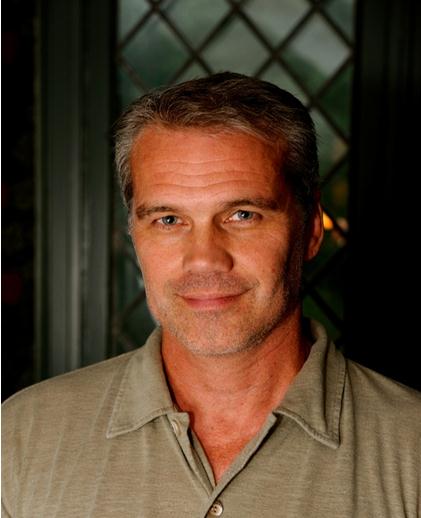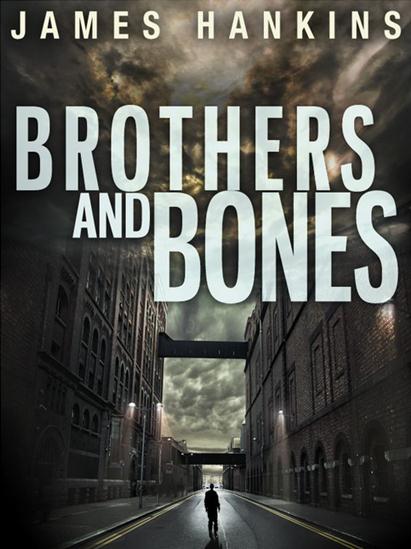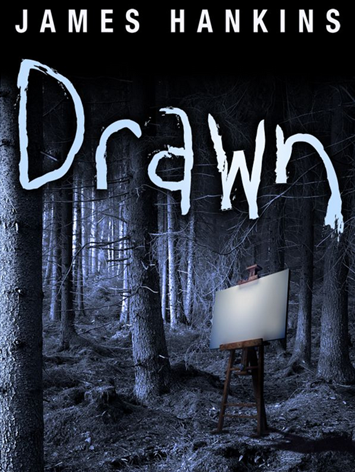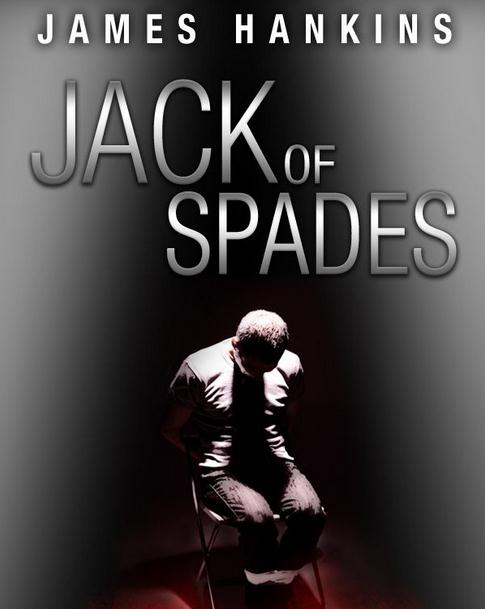The next interview in our self-publishing series is with crime and thriller writer James Hankins - on how he went from would-be film-maker, to lawyer, to best-selling author.

What or who inspires you to write?
I’m driven by a desire to tell stories. Quite simply, I’m happy when I write and less so when I don’t. I’ve written stories and books since I was young but, after high school, I went to N.Y.U. film school with the idea that I’d tell my stories cinematically. When Hollywood didn’t throw its doors wide open for me, I turned to novels. And even though I practiced law for a few years, I never stopped writing. I’m thrilled now to be doing it for a living.
For those who are unfamiliar, can you tell us about your books?
I have three out right now. They’re all thrillers of one kind or another. Brothers and Bones is about Charlie Beckham, a federal prosecutor who is on his way to court to start the biggest trial of his career when a deranged homeless man says two words to him that turn his world upside down. He calls Charlie by a nickname known by only one other person in the world—Charlie’s beloved older brother Jake, who went missing thirteen years ago. Charlie has a hundred questions but loses the homeless man in a crowd before he can ask a single one. His search for answers takes him into Boston’s most dangerous places and pits him against the city’s most ruthless people.
Jack of Spades is a thriller too, in the police procedural sub-genre. It’s about John Spader, a state police detective on the hunt for a serial killer who wears a toy mask bearing the cheerful, grinning face of wildly popular cartoon alien beloved by kids everywhere. The killer wears the mask and even speaks in the character’s cute, alien vibrato as he does terrible things to his victims. Spader draws the case because of its similarities to one he had years ago, one that has haunted him because the killer walked free on a technicality—free to kill again.
My third book is Drawn, a thriller with a supernatural angle. It’s the story of four very different people—a lonely artist; a partially blind, disfigured agoraphobe; a young runaway; and an elderly widower—compelled by very different forces (some supernatural, some far too human) toward a single, shared destiny. There are strange happenings, violent and unseen forces at work, ghostly apparitions, and some very bad people. Through it all, the life of an innocent boy hangs by a thread.
So, three thrillers, all a bit different from each other, but each intended to provide thrills, to keep readers turning the pages.

Cross-genre work is traditionally more likely to be rejected. Was this a problem you found with your work? To what extent is self-publishing giving readers and writers greater freedom when it comes to what they read/write?
I don’t think this was ever a problem for me. Though my books are different from each other, they are all thrillers that also fit relatively comfortably into their own sub genres. We simply never found the right fit for a book with a particular editor. And when we were originally testing the waters with traditional publishers, everything was in flux (and still is). Ebooks, self-publishing, the economy, and a host of other factors were changing the rules, rules that are still evolving. It was a strange time to be reaching out to publishers.
As far as self-publishing, the freedom it gives is nearly limitless. A writer can write whatever he or she wants and, with a little cash outlay, can publish it (though there is no guarantee that people will read it, of course). Traditional publishers might be unwilling to take risks on certain types of stories, or on authors without track records, but through self-publishing, a writer who believes in herself and her work can make sure it gets out into the world and then at least have a chance to find an audience. So if the gatekeepers at publishing houses simply don’t connect with a story for whatever reason, that story no longer has to languish forever in a drawer or on a computer hard drive.
When do you find time to write? Does this differ from when you started writing your first novel?
I wrote my first novel (not counting the ones I wrote when I was twelve) just after law school, when I was clerking for the Connecticut Supreme Court. I wrote only at night. While I practised law, I continued writing at night. After a few years of legal practice, our twin sons were born and my wife and I decided that I should stay home with them and write during nap times. I still wrote at night, too, of course. Now, I write all day while the kids are at school (and I still write at night every now and then).
You initially tried your hand at writing screenplays. How much do you think this is reflected in your novels? Is writing for the screen something you would like to return to in the future?
One of my main goals as a writer of thrillers is to write in a way that makes my readers want to keep turning pages rather than to put my books down. If I’m successful to any extent in that regard, I have to believe that my filmmaking/screenwriting education and experience at film school and in L.A.—experience that helped me learn to tell stories cinematically—have helped me a great deal.
Would I like to return to screenwriting? I think of stories in terms of novels these days, rather than movies I see in my head, so I’m a novelist now and intend to remain one. With that said, I would indeed be interested in writing a screenplay if the right opportunity presented itself—especially, if say, a film producer became interested in one of my books and wanted me to adapt it.
Why did you choose to self-publish? Did you try the traditional route first? Would you have taken the opportunity to go down the traditional route if that had been a possibility?
I self-published because getting the right book into the right editor’s hands at the right time isn’t easy, and I wanted my stories to be read—or at least published so I could see if anyone would be interested in reading them. Thankfully, there are indeed people reading them. We did reach out to traditional publishers but, to be honest, not all that many. As I said earlier, it was a tricky time in publishing.
Though there are always exceptions, on the whole, traditional publishing deals became harder to get and far less lucrative for as-yet unpublished authors. The economy wasn’t kind to anyone, of course. There were lay-offs and overhauls in the publishing industry, as there were in many other fields. It was a tough time to launch a writing career, though some were clearly able to do so. Now, would I have taken a traditional publishing deal at the outset? Yes, I probably would have, just to see a book in print, but there’s a good chance that it wouldn’t have been a great deal for me in the long run. I think things have worked out for me just as they should have.

What do you think the greatest advantage of self-publishing is?
In an earlier question you touched on what I think is self-publishing’s greatest advantage—freedom. First, without self-publishing, many good books would never be published. Self-publishing allows writers the freedom of getting their books out to the world without having to convince anyone else that their work deserves to be read—at least until they publish the books, at which point they have to start convincing potential readers to buy and read them. But now, a writer can write whatever he or she wants to write and there’s a chance it will find an audience.
Tell the story you have in your heart, or the one you can’t get out of your head, and even if no one else sees the glory that you see in it, you will at least be able to get it published. So, self-publishing gives you access to readers and the freedom to write whatever story you want to write. Also, you have final say over matters such as editing choices, cover design, and marketing (though even most traditionally published authors are expected to have a large hand in marketing their own books), to name a few.
On the other hand, is there anything you feel self-published authors may miss out on? Such as the editor-author relationship.
I haven’t been traditionally published, so I’m not speaking from first-hand knowledge, but I definitely think there are great advantages (if the deal is a good one). I have friends who are traditionally published authors and they do indeed enjoy their relationships with their editors. The good editors are interested in making the book as good as it can be, as well as making the author look as good as possible. Also, some authors might like the idea of a marketing team providing input into cover design. And, though, as I said, most authors do quite a bit of self-promotion and marketing, the best-selling authors have the weight of their publishers’ marketing teams behind them. So there are definite advantages to being traditionally published.
How, if at all, has having an agent been of benefit to you?
I’ve been fortunate enough to be represented by Michael Bourret of Dystel & Goderich Literary Management for several years now. We have a terrific relationship and I've benefited from his advice on many occasions. After reading one of my books for the first time, he invariably gives me valuable insight before I revise the manuscript. He gives me sound advice on the publishing industry and though my agency doesn't really get involved with marketing, Michael has given me good ideas and is there to steer me away from bad ones I might come up with on my own.
He secured for me a deal to turn my novels into audiobooks (which should be released in a few months), a deal that is far better, I think, than any I would have found on my own. And he’s always there if we decide to talk with traditional publishers, or with people in the film industry, or to discuss foreign rights with the appropriate people. I realize that many self-published authors don’t have, need, or want an agent, but I've certainly appreciated my relationship with mine.
How important do you feel interacting with your fans has been?
I have no idea whether it has been important from a marketing standpoint—that is, whether it sells more books—but it has been very important to me. I respond to every email. It makes my day when a reader reaches out to me personally to tell me how much they liked my books, or to ask an insightful question about something in one of my stories, or to say how much they are looking forward to my next book. I really appreciate the fact that someone took the time to visit my website just to contact me through it. Time is valuable, and the fact that people spend some of theirs reading my books, then contacting me about them, means a great deal to me.
Do you feel there is more of a sense of community with self-publishing than there is with traditional publishing? You’ve previously spoken about the support your family gives you in your writing career. Do you also find the self-publishing community a source of support?
Again, I'm not in the traditional publishing community, though I do know people in it, but I do appreciate the self-publishing community. I have other friends who have self-published—friends from before I also published, and others I've made after I published. Other writers are generous with advice on what they did that worked, what mistakes they've made that should be avoided, and I’ve been in touch with and met with aspiring writers who wanted my advice on such things. I think we all know that as more and more indie authors succeed, we can all benefit.
How important is marketing yourself in the early stages of your self-publishing career? Any tips?
Marketing is crucial throughout one’s career. As I said earlier, for the most part, all authors need to market their books and themselves, but it could be even more important for a self-published author to develop strong self-promotion skills. I don’t know how strong my own skills are, to be honest, but I’ll give you my thoughts. In the beginning, market hard. Put your back into it. But after a while, hopefully after the book gets some legs, make sure you leave time to write. It’s easy to focus on marketing your books and lose focus on actually writing your next one.
Eventually, find a balance you’re comfortable with—say, one-fifth of your workday marketing and the rest writing. Also, because many self-published authors will find their biggest audiences—often their only audiences—online, my advice is to focus marketing effort and money on online avenues as opposed to efforts made in person or in print. Use social media wisely. Find a balance there, too. Overdo it and you risk alienating people. Finally, many writers write terrific blogs that drive traffic to their websites and raise awareness about their books. I think that’s a great idea, though it’s something I haven’t done yet. Maybe one day.

Did you design your own cover? How important do you think cover design is to a potential reader?
The concepts were mine but I hired a terrific graphic designer in Seattle, Washington named Asha Hossain to execute them. I really like her work and look forward to working with her on my next book’s cover. I do think that covers are very important to a potential reader. An uninspired cover could turn people away before they even bother to read what the book is about. I've had people tell me that they bought a book of mine based on the cover alone. If one hires a graphic designer, it helps, I think, to choose one with experience designing covers for ebooks. They have a good sense of what will work in a thumbnail image on a computer screen. The title, author’s name, and central image of the cover have to work in a small format.
Finally, do you have any advice for writers looking to self-publish?
I’m sure I won’t say anything ground-breaking here, but first and foremost - regardless of whether you will publish traditionally or independently - always make time to write. And to read. Never stop reading and being inspired by writers who have gone before you. And be prepared to be a tireless self-promoter, which isn’t always easy or fun, but is tremendously important.
I would definitely advise writers looking to self-publish—if they can afford it—to consider hiring a professional graphic designer for their covers (unless they are themselves, or happen to know, particularly skilled designers) and, just as importantly, to hire a professional copy editor. No matter how many times one reads through his or her own manuscript, there are things we miss, things our eyes skip over because we wrote it, and things we never even thought to look for. Professional editors know conventions about spelling variations, whether to capitalize certain professional titles or departments, for example, and they can catch unwanted word repetition we might overlook. If a writer can afford it, I think it is money well-spent.
Most of all, though, I return to this—keep writing.
If you would like to find out more about James and his books, visit his website.
Comments